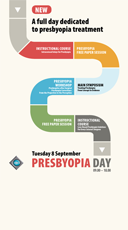Nomogram for femtosecond-laser arcuate keratotomies: 1 year follow-up
(results will display both Free Papers & Poster)
Session Details
Session Title: Presented Poster Session: Femtolaser Refractive Applications
Session Date/Time: Saturday 05/09/2015 | 09:30-11:00
Paper Time: 10:20
Venue: Poster Village: Pod 2
First Author: : P.Hoffmann GERMANY
Co Author(s): : M. Abraham
Abstract Details
Purpose:
To prove efficacy, predictability and long-term stability of fs-laser arcuate keratotomies based on a newly developed nomogram.
Setting:
Private eye clinic in Germany
Methods:
AKs were performed at an optical zone of 8.5mm and 80% of local depth. After the laser procedure, the cuts were manually opnened with a blunt hook. 70 complete AK data sets including the 3-month-visit were analyzed; this included 43 eyes from a prospective study. 36 eyes were available for the 1-year-visit. The remaining subjective and objective (vector mean of TMS-5 and Lenstar) cylinder was evaluated as well as the vector change of cylinder between different time points. Scatter plots were used to check this data against the nomogram that was developed in 2013.
Results:
Objective cylinder was 1.48±0.80 D (= target cyl) preop, subjective cylinder 0.57±0.34 D @ 1 month, 0.61±0.34 @ 3 months and 0.40±0.19 D @ 1 year. Correction index based on the Castrop AK nomogram was 0.97±0.28 @ 1 month, 0.92±0.34 @ 3 months, 1.00±0.29 @ 1 year. Cylindrical prediction error was 0.60±0.34 D compared to 0.50±0.37 D for toric IOL procedures by the same surgeon. Vector change of cylinder over time was +0.07±0.31 D from 1 month to 3 months and –0.10±0.22 from 3 months to 1 year.
Conclusions:
Fs-laser AKs were predictable and only slightly inferior to toric IOLs in the given indication range up to 2 D. They were stable over time with the mean absolute variation below recognition threshold of the patient. The nomogram performed very well with a correction index close to 1.0 at all time points. With online pachymetry and rotational compensation available on the laser system since 08/2014, we expect further improvements especially reducing the number of outliers with a cylindrical prediction error of 1 D or more.
Financial Interest:
NONE





